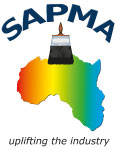COATINGS SECTOR PAYING HEAVY DUTIES FOR IMPORTING RAW MATERIAL NOT AVAILABLE LOCALLY
The South African coatings industry is desperately waiting for a government rebate on the import duties for titanium dioxide which is costing its members millions of rands to import despite the fact that there is no local source of this vital raw material for the production of paints, varnishes and driers.
Tara Benn, executive director of the SA Paint Manufacturing Association (SAPMA), says there has been no local production of titanium dioxide since 2016 and therefore no SA industry to protect by the imposition of import duties. “Yet, despite pleas to the government, no rebate on the heavy import duties has yet been implemented. Most of the titanium dioxide has had to be sourced from China.
“Now, six years later, the International Trade Commission Administration (ITAC) - only on June 22 this year - published an amendment gazette stating that an import duty rebate was planned for a period of two years. The rebate would only apply for two years as, according to ITAC, local production of titanium dioxide would then have started at a new multi-billion rand Nyanza Light Metals plant being constructed at Richards Bay. But we still have no idea when the rebates will be introduced – nor an official date for the start of local production to fully meet our industry’s needs,” Benn stated.
She said SAPMA members’ profitability had been severely affected by the heavy import duties, coupled with Covid-19 challenges. “It has undoubtedly also hit all consumers of coatings which are suffering because of supply delays and unavoidable pricing strategies required to cope with the cost of importing titanium dioxide,” she added.
Tonderai Chibasa, Tariff and Trade Remedies Manager at global trade advisors, Xaqta, which is trying to expedite the implementation of the rebates on behalf of SAPMA, said: “We have engaged with ITAC on a number of occasions and the only response we get is that the investigation is at an advanced stage. We suspect the delay is being caused by the Ministry of Trade, Industry and Competition which has to make the final decision following ITAC’s recommendation. It is worth noting that the delays are not unique to the titanium dioxide investigation. We are seeing delays across all ITAC open investigations regarding customs duties,” Chibasa said.
He added that, in addition to being widely used in the coatings industry, titanium dioxide is also an important raw material for many other industries such as manufacturers of adhesives, paper, plastics and rubber, printing inks, coated fabrics and textiles, ceramics, floor coverings, roofing materials, cosmetics, toothpaste, soap, water treatment agents, pharmaceuticals, food colourants, automotive products, sunscreen and catalysts, to name just a few.
The Deputy Minister of Trade, Industry and Competition (DTIC), Nomalungelo Gina, recently said the government was happy with the progress made at the new titanium dioxide pigment plant based in the Richards Bay Industrial Development Zone (RBIDZ). Gina visited Nyanza Lights Metals to evaluate the phase one completion of the infrastructure being built by the company for its chemicals plant.


